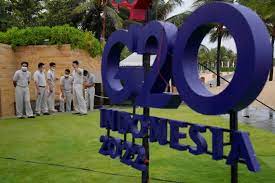Jakarta, July 7: Foreign ministers from the Group of 20 leading rich and developing nations are gathering in Indonesia’s resort island of Bali for talks bound to be dominated by the conflict in Ukraine despite an agenda focused on global cooperation and food and energy security.
The one-day gathering will take place on Friday on the mostly Hindu “island of the gods” in the majority Muslim archipelago nation.
Underscoring the backdrop of tensions hanging over the meeting, Chinese Foreign Minister Wang Yi and Russia’s top diplomat Sergey Lavrov stopped in various Asian capitals on their way to Bali, drumming up support and fortifying their ties in the region ahead of the talks.
The United States and its allies have sought to punish Russian President Vladimir Putin in as many ways as possible, including by threatening a boycott of the G-20’s Bali summit in November unless Putin is removed from the forum.
So as this year’s president of the G-20, Indonesia has been forced into playing a more constructive role on the world stage rather than acting just as an “event organizer.” The country has sought to remain neutral in dealing with Russia’s invasion of Ukraine and President Joko Widodo has been guarded in his comments.
Widodo was the first Asian leader to visit the warring countries. Ukraine is not a member of G-20, but Widodo has invited Ukrainian President Volodymyr Zelenskyy to the November summit along with Putin, hoping to appease all sides and limit any distractions from the forum’s agenda.
Zelenskyy has said he won’t attend if the war is continuing then and has opted to follow the discussions by video link. Widodo reportedly told Italian Prime Minister Marion Draghi, on the sidelines of the Group of Seven summit in Germany, that Putin also will not be coming. Moscow has said a decision has not yet been made.
That apparent compromise may be put to the test when the G-20 foreign ministers gather in Bali’s heavily-guarded Nusa Dua tourist haven to lay the groundwork for the 17th summit of the West’s economic powerhouses.
Strains between Washington and Beijing are also apparent: On Wednesday, China launched a scathing attack on the U.S. And NATO, just days before U.S. Secretary of State Antony Blinken and the Chinese foreign minister are due to meet in Bali.
Washington “observes international rules only as it sees fit,” Chinese Foreign Ministry spokesperson Zhao Lijian told reporters in Beijing. He said the “so-called rules-based international order is actually a family rule made by a handful of countries to serve the U.S. Self-interest.”
A key aim of the talks will be to seek ways to improve food security at a time when Russia’s invasion of Ukraine has choked global markets, pushing prices of meat, dairy products, cereals, sugar and vegetable oils sharply higher.
“These visits are not only important for Indonesians but also for other developing countries in order to prevent the people of developing and low-income countries from falling into extreme poverty and hunger,” Widodo told reporters in Jakarta before his departure to Germany on June 26.
Russia and Ukraine account for a third of the world’s wheat exports and Ukraine alone grows enough of the grain to feed 400 million people. But Moscow’s blockade means Kyiv can only move 2 million tons a month, 60% less than usual.
Millions of tons of Ukrainian grain are sitting in silos waiting to be shipped through safe corridors in the Black Sea. Ukraine also is one of the world’s largest exporters of corn and sunflower oil, but Russia’s invasion halted most of that flow. Such disruptions threaten food supplies for many developing countries, especially in Africa.
The crisis is having inflationary ripple effects in Indonesia, including a shortage of flour that is compelling local companies to raise the politically-sensitive price of instant noodles, a hugely popular Indonesian staple.
Russia has pledged to increase its wheat exports to Indonesia. Last year, those amounted to only 2,955 tons compared with the 3 million tones imported from Ukraine.
Indonesian Foreign Minister Retno Marsudi has told reporters it’s important to achieve a resumption of grain exports from Ukraine and food and fertilizer exports from Russia to end shortages and reduce prices.
Rising costs of cooking oil prompted Indonesia, beset by student protests over skyrocketing food prices, to temporarily ban exports of palm oil products. Exports of crude palm oil, used in a wide variety of foods, cosmetics and other products, resumed a month later.
Indonesia and neighboring Malaysia are the world’s largest exporters of palm oil, accounting for 85% of global production.
Foreign ministers headed to Bali on Thursday come from Argentina, Australia, Brazil, Canada, China, France, Germany, India, Italy, Mexico, Russia, Saudi Arabia, South Africa, South Korea, Turkey, the United Kingdom, the U.S., and the European Union.
Blinken is scheduled to meet with Wang, Beijing’s top envoy, on Saturday. The meeting will be the latest high-level contact between U.S. And Chinese officials as Washington has questioned China’s stance after Russia’s invasion of Ukraine. The two sides could also discuss a possible lifting of U.S. Tariffs on imports from China by President Joe Biden’s administration as it strives to counter inflation.
While in Bali, Lavrov is due to hold meetings with his counterparts from other countries, including China, Mexico, South Africa and Brazil on the sidelines of the G-20 foreign ministers. He also plans consultations with invited leaders of international organisations, according to Russia’s embassy in Jakarta.
Members of the G-20 account for about 80% of the world’s economic output, two-thirds of the world’s population and about three-quarters of global trade. (AP)


